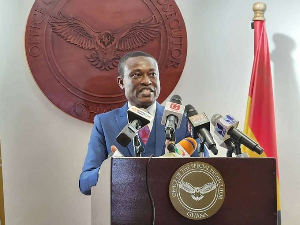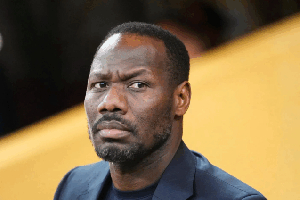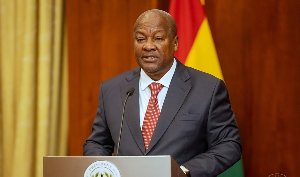In my very sombre moments, I cannot help taking another look at where Ghana is coming from, since nationhood, almost six decades ago, where we have reached today and the prospects for the future.
Sometimes I go back to the last years of colonial rule, how we lived our lives in those days, and compare the situation then with what pertains today.
It was a very simple society then, especially the years before independence. Everything was so calm and peaceful. There was no rush in life and nobody was in a hurry to do anything big. Nobody envied anybody who had the means to build a house or own a car for private use or taxis or lorries for commercial purposes.
Certainly, there were a few rich ones, by the standards of those days. Nobody cared much about them because the poor could also live a decent life without going to beg from the rich. At least nobody was paying for education or health care.
Very few homes had water or electricity. I don’t remember if people were paying for these amenities. But there were public stand pipes, public toilets and public bathhouses for the use of everybody.
Allah Bar then and today
I still remember our small community of Allah Bar in Kumasi. It was such a quiet place then, compared to the chaos of today, where human beings, bicycles, tricycles, cars, buses and trucks are competing for space. Today, Allah Bar is one hell of a place where life could be squeezed out of the weak by the sheer force of the crowd that is always moving to nowhere, from morning to evening.
Yet, in those good old days from the mid-50s when we became conscious of our existence, everywhere in Allah Bar was always quiet. From our house you crossed the main Allah Bar road and you met one row of houses stretching to Aboabo Station. Behind that row of houses was a large expanse of space that is separated from the Kumasi Central Market by the Kumasi-Accra railway line.
To the west of the space were a public toilet, a public bathhouse and standing pipes. To the east we used to call French line, where one could change French currency with British currency. There was also space for those dealing in live goats and sheep, where we used to troop to buy ram during Id-ul-Adha celebrations.
Today, there is no space for sellers of goats and sheep while those who deal in currencies have been pushed to the main road which has become a highly commercial area with all sorts of shops, banks and micro-finance offices. Gone too are the public toilet and bathhouse and the standing pipes.
That spacious area has now been taken over by traders in foodstuffs, making it an extension of the central market. It is such a crowded place that unless you are going to buy something from the place, it’s a no go area. Since train services ceased to operate between Kumasi and Accra, the railway line has also been taken over by traders.
Rapid development
My dear readers, I’m using Allah Bar to illustrate the present and compare it with the past because that is where I was born and where I go every now and then. I’ve seen the rapid developments that have taken place at Allah Bar over the years, with most of the old mud buildings yielding place to big modern houses.
One can, therefore, say a lot of progress has been made. Many more people have received better education and with it better living conditions.
The nouveaux riches are not satisfied with living in single rooms. The minimum is hall and chamber, and many can afford to build their own houses—leading to expansion and extension. The young ones who were born at Allah Bar are now moving to the outskirts of Kumasi for plots of land, making Kumasi also grow.
The situation in Allah Bar, therefore, encapsulates all that is happening throughout Ghana. Business is booming everywhere and we all believe civilisation has even arrived. Those in the villages or rural areas can no longer stay there. They must move to the urban centres and cities where the allure of civilisation cannot be resisted.
In spite of all the progress we have made as a nation, this is the time people are crying and talking about suffering in the land, with all apologies to Jimmy Cliff. This is the time people are crying over school fees, since even those down the social and economic ladder would like to send their children to private and expensive schools when the public basic schools are virtually free and affordable.
The power outages (dumsor) palava has made matters worse, with businesses, big and small, grinding to a halt, and throwing many into joblessness. One doesn’t have to fall sick, since going to hospital is hell while the cost of medicines for even small illnesses is no longer bearable.
Just think about the number of graduates from our universities and polytechnics coming out of school without jobs. Compare this with the early 60s, when graduates will come out of university smiling, because jobs were waiting for them, sometimes with cars provided. That was the time when even those coming out of secondary schools were easily absorbed by the civil service where they started life as executive officers in various ministries.
What can be responsible for our present predicament as a nation when there is every indication that we have made so much progress since independence?
Noise and silence
Well, dear readers, I cannot but agree with my former editor at the Daily Graphic in the glorious 70s, Madam Elizabeth Ohene, who stated in her piece in the Daily Graphic of October 12, 2015 titled: “The Difference Between Noise and Silence” that “I have always put part of the blame for our many problems in Ghana on our unsustainable rate of population growth.”
That article in her weekly Wednesday column was written after her return from Norway, where she had attended a conference on the International Consortium of Investigative Journalists (ICIG).
In her argument over this issue, Auntie Lizzie further stated that at independence in 1957, both Ghana and Norway had the same population of around five million, but now 58 years later, Ghana’s population is 28 million and Norway’s population is just over five million, meaning Norway’s population has been stagnant for almost 60 years while we are producing as if it is no man’s business.
Is this not a case of hitting the nail right on the head? While the developed nations of Europe and America and Japan and China have been trying to control their population growth, that is none of our business in the developing (or under developed?) nations of Africa.
Do I need to further elaborate on this? Certainly, our rapid population growth has caused a lot of harm to us as a nation. We are faced with the situation of demand outstripping supply. Yes, there are many more Ghanaians chasing fewer amenities. No matter the efforts of the government to provide amenities for all Ghanaians, the problem is that these amenities can never be sufficient for the growing population.
Power crisis
Dumsor is the greatest challenge we are facing as a nation. When Akosombo was built in the late 50s, we had surplus electricity and we even sold some to our neighbours.
Today, because of civilisation, everybody is using electricity for everything because we want things to be done the easy way. From the barber to the baker, from the tailor and dressmaker to the hair dresser, everybody is using electricity.
The other day when I went to Commonwealth Hall, University of Ghana, I was amazed to find so many fridges at the Porters’ Lodge. I asked one of the porters whether they were for sale and he told me they belonged to students who were returning from holidays.
Later I got to know that every student has a fridge and other appliances, and it is even worst where the females live. I learnt many have even got dryers in their rooms. With this alone, no matter the effort of the government to increase electricity supply, we are bound to have short falls.
I really worry about the future the way things are going. Remember the recent report in the media that 35,630 candidates applied to enter the University of Ghana this year but only 18,106 applicants gained admission? Where do the rest go or do? This was a case of limited facilities. Any hope that the facilities would be available next year? I vey much doubt this. Yet, believe me, there will be more applicants next year than this year.
State of health institutions
The other day I was reading Vicky Wireko’s “Reality Zone” Column in the Daily Graphic titled “Korle Bu Hospital Roads Need Resuscitation” and she complained bitterly about the deplorable conditions of the road network in the nation’s leading hospital. These pot-holed roads are the same used to convey the seriously sick to the hospital. Won’t the road conditions further affect the condition of the sick?
What attracted me, however, was her remembrance of her involvement in a domestic accident. She was lucky to have survived, thanks to Korle Bu. I still remember the incident since we were both working at “Graphic” at the time and we used to visit her at the hospital.
When I called Sister Vicky last week to find out about the cost of treatment, she told me she spent three months without paying a farthing. What would have been the situation if it were now?
I still remember my own case when I was admitted to the Komfo Anokye Teaching Hospital while teaching at Great KOSS. I was in and out of the hospital on two occasions for a treatment of jaundice in the early 70s. I didn’t even pay for the hospital card.
We have come a long way from the good old days to our present situation. I wonder what would be the case in another decade or two. Your guess is as good as mine.
Opinions of Saturday, 7 November 2015
Columnist: Razak El-Alawa














